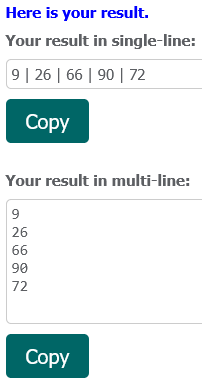Online random number generator, integer & decimal
This tool is used to generate one or multiple random numbers (up to 5,000 results).
It accepts negative number input. For example: -1234.56.
Type of result:
What is this online random number generator?
It is a free online random number generator that was made by the 'PU Tools' developer team. The number of uses is unlimited without any registration requirement.
It will give you a list after the generation has finished.
It accepts both negative and positive numbers. The result can be an integer type or decimal type with 2 digits of precision of your choice.
It can generate up to 5,000 numbers, and the result has two types: a single-line result and a multi-line result.
Below is the test vector with these parameters: Range = 1 -> 100, Results = 5, Type = integer.

About the random numbers.
They are a common concept in statistics and computer science. They're generated by an unpredictable process.
This means that you can't predict with certainty what the next number will be while you look at a list of them, even if you know all the numbers that came before it.
Why are they so attractive? Because their unpredictability is what makes them unique.
There are 2 types:
- True random: They are produced by really random physical events, such as thermal noise in electronic circuitry, air noise, or radioactive decay. At the quantum level, these processes are genuinely unexpected.
- Pseudo-random: They are produced by algorithms. They seem random, but in fact follow a pattern. These methods generate sequences of numbers that appear random but satisfy many statistical tests of unpredictability. They are widely used in fields like cryptography, simulation, and more. However, if you generate enough numbers, the series will lastly repeat because they are based on a mathematical formula and an initial "seed" value. They are sufficient and more effective than real random numbers for the majority of applications, particularly in games and simulations.
How useful are they? Here are some key applications:
- Daily use: Shuffle songs in a music app or randomize video playlists. Generate security tokens, passwords, or IDs at random. Generate CAPTCHA code to stop automated bots.
- Computer science: Cryptography relies heavily on the generation of strong random keys. There are many model uncertainties in simulations using them, such as traffic flow, weather forecasting, molecular dynamics, etc.
- Statistics: Random sampling is fundamental to statistical inference. Monte Carlo simulations and the selection of representative samples from populations are both done using them.
- Mathematics: They are used in pretty many numerical methods, such as numerical integration and optimization.
- Finance: Using random processes to simulate market movements is a common practice in financial modeling.
- Art and creativity: There are many artists and musicians who sometimes use random processes to generate unexpected and creative outcomes.
- Lottery and gambling: The core of these activities is to create unpredictable results. The result of a random generator between 0 and 1 is like flipping a fair coin (head-or-tail).
--------------------------------------------------
Above is basic information about random numbers. If you want to discover more, please visit: Random Number on Wikipedia.
Related Tools
Our Popular Tools
Encryption Tools
Encoding Tools
Decoding Tools
Text Tools
Data Tools
Date and Time Tools
Finance Tools
